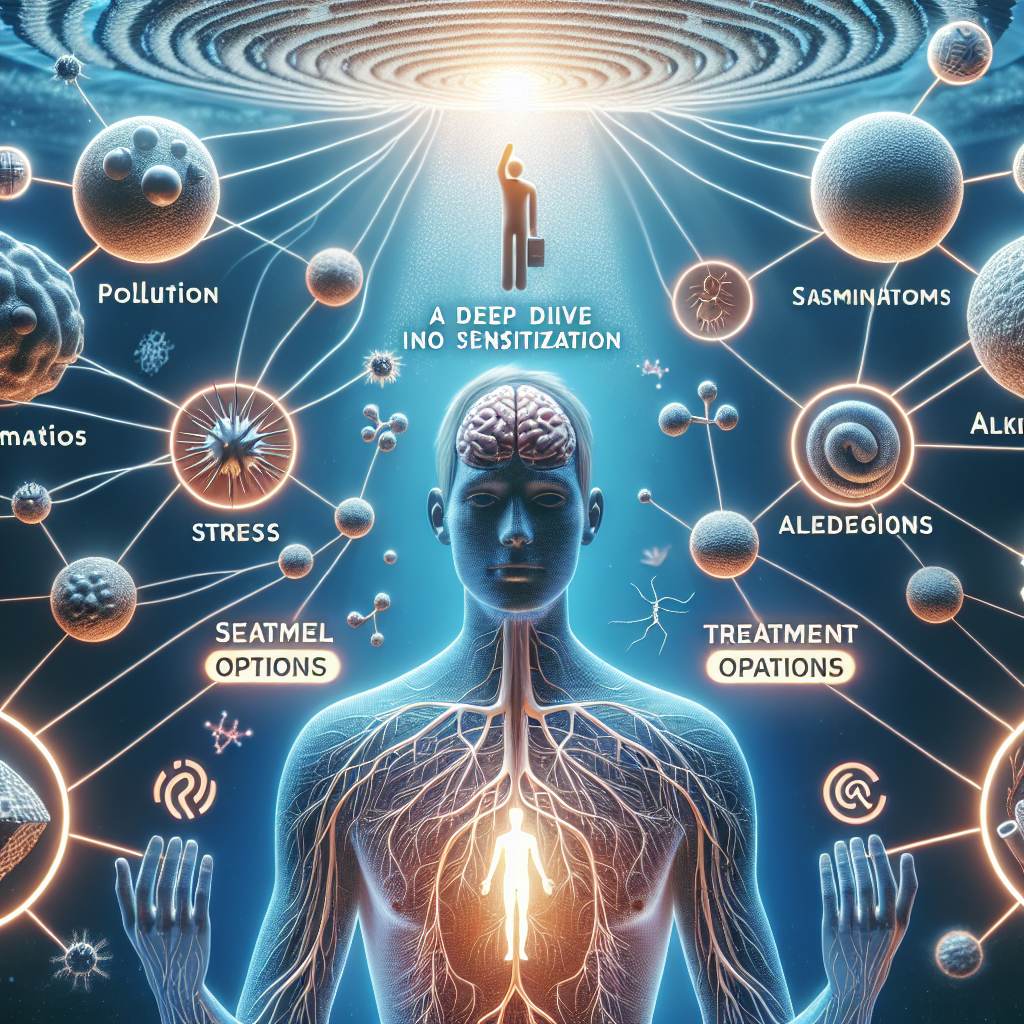
Introduction
In our ever-evolving world, the concept of sensitization looms large, particularly in discussions about health and wellness. Imagine being hyper-aware of environmental triggers, developing unexpected reactions to substances once deemed harmless, or even experiencing heightened emotional responses. Sensitization, while a complex phenomenon, is incredibly relevant, affecting millions of individuals across various demographics. This article offers a comprehensive exploration of sensitization, shedding light on its causes, symptoms, and treatment options.
Why Sensitization Matters
Understanding sensitization is crucial, as it can lead to debilitating conditions such as allergies, asthma, and chronic pain syndromes. Moreover, with increasing exposure to allergens and pollutants, a deep dive into sensitization could illuminate the avenues for prevention and treatment, helping individuals reclaim control over their lives.
What Is Sensitization?
Sensitization is a biological process wherein the immune system reacts more intensively to a substance, or allergen, after previous exposures. This heightened responsiveness can manifest through various pathways in the body, impacting physical and mental health.
The Science of Sensitization
Immune Response: The immune system perceives certain substances, such as pollen or certain foods, as threats. Upon first exposure, it may mount a mild reaction. However, with repeated exposure, the immune system escalates its response, often resulting in allergies or sensitivities.
- Central Nervous System Involvement: Sensitization isn’t just limited to the immune system. The brain can also become sensitized to pain signals, leading to chronic pain conditions.
Case Study 1: Allergic Reactions to Common Foods
Take the case of a 30-year-old woman who enjoyed peanuts throughout her life. After a minor reaction in her twenties—such as hives after eating peanut butter—she previously brushed it off. After a subsequent exposure, she faced a severe allergic reaction requiring emergency medical treatment. This illustrates how sensitization can shift a benign interaction into a life-threatening one.
Causes of Sensitization
It’s vital to identify the factors that contribute to sensitization. The causes can range from genetic predispositions to environmental triggers.
Genetic Factors
Certain individuals may inherit a propensity for sensitization. Family histories of allergies can often predict susceptibility to similar conditions, emphasizing the role of genetics.
Environmental Factors
Pollutants: Air pollution and allergens like pollen, dust, and animal dander can prime the immune system for sensitization.
- Lifestyle Choices: Diet, stress, and lack of exposure to certain germs during early childhood can influence immunological responses.
Psychological Factors
Psychological stress can amplify the body’s sensitivity, leading to heightened reactions. This is particularly evident in conditions such as fibromyalgia, where stress exacerbates pain perceptions.
Case Study 2: The Role of Stress
A 45-year-old man developed acute asthma symptoms following a high-stress period at work. His doctor noted that stress could have heightened his sensitivity to pollen, revealing the interplay between psychological stress and physical health.
Symptoms of Sensitization
Recognizing the symptoms of sensitization is essential for timely intervention. They can be broadly classified into physical and psychological symptoms.
Physical Symptoms
Allergic Reactions: Hives, rashes, and in severe cases, anaphylaxis are common.
Gastrointestinal Issues: Nausea, vomiting, or diarrhea, particularly with food sensitivities.
- Respiratory Problems: Shortness of breath and wheezing, particularly in cases of respiratory allergens.
Psychological Symptoms
Heightened Sensitivity: Increased anxiety around certain environments or substances.
- Mood Fluctuations: Chronic sensitization can lead to prevalent mood disorders such as depression or anxiety.
Table 1: Common Symptoms Associated with Sensitization
| Type of Symptom | Examples |
|---|---|
| Physical Symptoms | Hives, nausea, asthma |
| Psychological Symptoms | Anxiety, mood swings |
Treatment Options
While sensitization can feel daunting, various treatment avenues can provide relief and management strategies. The choice of treatment often depends on the severity of symptoms and individual circumstances.
Avoidance Strategies
For many individuals, simply avoiding known triggers is the first line of defense. This can include dietary adjustments, environmental controls (e.g., using HEPA filters), and stress management techniques.
Medication
Antihistamines: Effective for managing allergic reactions and reducing symptoms.
Corticosteroids: Used in more severe cases to reduce inflammation.
- Pain Relievers: Over-the-counter options for alleviating chronic pain associated with sensitization.
Immunotherapy
Allergy shots or sublingual tablets can gradually reduce the body’s sensitivity to specific allergens. This proactive treatment has been proven beneficial for several individuals, particularly those suffering from severe allergies.
Alternative Therapies
Acupuncture: Some studies suggest that acupuncture may help in reducing sensitization-related symptoms.
- Cognitive Behavioral Therapy (CBT): Useful for managing anxiety and mood-related aspects of sensitization.
Case Study 3: Successful Immunotherapy
Consider a 25-year-old man who underwent immunotherapy for his severe pollen allergies. After a course of treatment, he reported significant improvement, allowing him to enjoy outdoor activities without fear of allergic reactions. This showcases the effectiveness of proactive treatment strategies.
Conclusion
A deep dive into sensitization reveals a multifaceted issue impacting numerous individuals globally. From its biological origins to its profound symptoms and the array of treatment options available, understanding sensitization is crucial for anyone affected by this condition.
Takeaway Message
If you suspect you or someone you know may be experiencing sensitization, whether it’s in the form of allergies or heightened sensitivities, don’t hesitate to seek professional guidance. Knowledge is the first step toward reclaiming control over one’s health!
FAQs
1. What is sensitization, and how does it occur?
Sensitization is when the immune system develops an excessive response to a substance after repeated exposures, which can lead to allergic reactions or heightened sensitivity.
2. How can I tell if I am sensitized to a particular substance?
Symptoms may include hives, digestive issues, or respiratory problems after exposure. A healthcare provider can conduct tests to confirm sensitization.
3. Are there specific treatments for food sensitization?
Yes, avoidance of allergens, medications like antihistamines, and immunotherapy are common treatment options.
4. Can psychological factors influence sensitization?
Absolutely! Psychological stress can exacerbate physical symptoms and heighten sensitivity to allergens.
5. Is sensitization permanent?
Not always! With the right treatments, individuals can experience significant improvement, and some may even outgrow certain sensitivities.
In concluding our deep dive into sensitization, it’s vital to foster awareness and understanding, enabling better management and quality of life for those affected.











